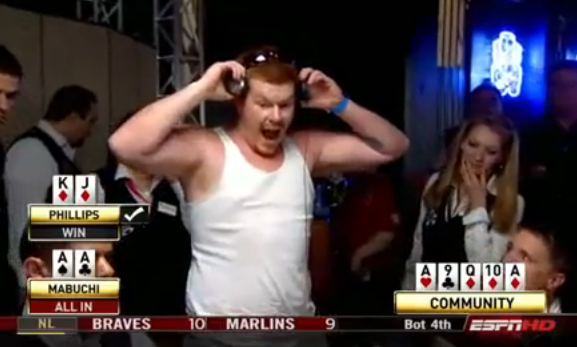Handling Bad Beats in Poker

No matter how strong of a poker player you are, you are going to suffer bad beats. Properly handling these beats is important to playing your best game. Today, let’s take a look at some beats you may run across at the table and the best way to handle them.
Losing a Huge Pot to a Suckout
Let’s say you are playing $1 – $2 NL cash game and have about $300 at the table. You raise to $12 with pocket kings and get called in two spots. Both players have about $250 behind them. The flop falls K-J-7 and you bet out $30.
Your first opponent calls, followed by an all-in shove by your other opponent on the button. You snap call and amazingly, so does your other opponent. There is nearly $900 in the pot. The initial raiser shows A-Q and your other opponent shows pocket tens. You have a huge lead only to watch a ten hit the turn to give the initial raiser a broadway straight. The board fails to pair and you lose a huge pot.
While it sucks that you lost such a huge pot in this situation, it is not totally out of the question. You were about a 67% favorite to win on the flop in this situation and while you should make that play every day of the week, it still means that 33% of the time you will lose. It doesn’t help the sting of losing, but realize that one time in three, this will be a losing hand. Over the long term, you will turn a profit from this scenario.
Losing to Drunks or other Donkey Players
You have a player that is raising at random. He might be a drunk, or he might just be someone that doesn’t really care about the money. Maybe he is a guy that is just playing for fun or maybe he is someone with money and uses poker as cheap entertainment.
Either event, he raises at random and when he is called, he has utter junk cards. He decides to go all-in at random for $125 and you look down to pocket kings and call. Your opponent looks at his cards and starts laughing hysterically as he flips over pocket aces. You do not catch and lose a huge pot to this donkey.

Remember that one time your quad aces got cracked by a K-J?
Let me play with this guy any time he wants to play. The situation above was just unadulterated dumb luck. That is going to happen. Just realize that it is luck and that you want this type of player at the table. I once had a guy sit down to a $1-$2 game and tried to buy-in for $2,000. (The max was $500.) This guy moved all-in blind once an orbit.
Every time he was in, he had at least one caller. He did get lucky and take a few nice pots, but by the end of the night, he had lost that $2,000 he wanted to buy-in with. Of course, the then took another wad of $100 bills out of his pocket and went over to play blackjack. Some people have more money than they have sense. Welcome these people to your game.
Busting Out Near or On the Bubble in a Poker Tournament
There are fewer things more frustrating in poker than playing several hours, or in the case of the WSOP Main Event, days just to bubble the tournament. This can be what players call “soul-crushing,” but is something we have all experienced.
I have bubbled in many live and online poker tournaments. Some of the times I bubbled were my own fault, such as nursing a short stack without making the moves necessary to try and build a stack. Other times, I suffered a bad beat and was crippled or knocked out on the bubble.
When these situations happen, first evaluate your play. Was there something more you could have done to survive the bubble and give yourself a shot to win? If so, consider making the necessary adjustments to your game for the future.
Otherwise, recognize that you are going to bubble your fair share of poker tournaments. The best players in the world only cash in about 10 to 20 percent of the events they play. You’re going to bubble on occasion regardless of your skill.
Handling bad beats is just another part of playing solid poker. If you find yourself steaming or tilting because of a bad beat at the table, take a break, or even quit. With time and practice, you will learn to handle beats better and will become nearly untiltable. That is until someone beats you for a massive pot hitting a one outer.
